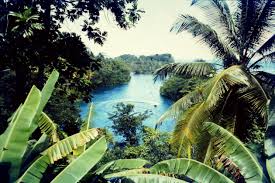Our Spiritual Environment – Care For the Earth

Looking into Native American culture can help us to better understand our African ancestors.
“Care for the Earth, Give thanks frequently”. This is the first line in “How to be an Ally to Indigenous Peoples”, a poster created by The Two Row Campaign and Syracuse Cultural Workers.
Looking into Native American culture, we see a love and respect for the Earth, and a view that Life is constantly being created and comes from the Earth. Here “the Earth” means everything around us. This includes the ground, the trees, the birds, the rocks, the sky, and also the air, the people, the feelings of the people, the feelings of the animals, the mental and spiritual environment. The Earth means everything. It also includes an under-current of thought: that everything wasn’t just created a long time and set to run on its own. The paradigm is that Everything has been created and is being created continuously and the source of that creative activity is The Earth.
Reference: Larry Merculieff, Indigenous Aleut Advisor to NRCS, Seven Generations Consulting
One spiritual exercise I take sometimes is to close my eyes and mentally stand in nature , as our African and Native American ancestors would have, and feel Nature all around me. Let my awareness include the ground, the life, the air, The Earth all around me — all of this interacting with my Spirit. I let myself be more and more aware of my Spirit being a part of it all.
Better understanding our African Ancesors

With this view, it is easier to see and agree with the Native American idea of The Earth as being Sacred. Thinking of the Sacredness of The Earth, we better understand the value of each other and of our own lives. We understand better the nature of our own Spirit, and through the same process we better connect with the Spirits of our Ancestors. Gaining a better understanding of the Sanctity and Connected-ness of all Life, we better understand the African tradition of seeing our Ancestors as Sacred as well, especially given the Nature of our Spirit, the Nature of their Spirit, and our Connection with them.
Going from this understanding of The Earth as everything around us, physically and spiritually, and then backing away from the mental ideas, and just feeling the feeling of it, you come to the same place as when you start with the concept of God in Christianity, Islam, Judaism, and I think it’s the place you get to when you start with Taoism, Buddhism, and the idea of spirituality in general — the feeling of Source and Connection and Everything existing as a part of God.
This first line of the poster, “Care for the Earth, Give Thanks Frequently”, resonates with the first of Jesus’ commandments In the Christian Bible: Love your God, with all your heart and all your soul. When you take a moment to consider what is meant by “The Earth”, you see the resonance also with the 2nd of Jesus’ commandments: Love your neighbor as your self.
Indigenous Perspective:
By Larry Merculieff, Indigenous Aleut Advisor to NRCS, Seven Generations Consulting
The term “natural resources conservation” is a western management term not reflective of the relationship of indigenous cultures to their environment. When NRCS employees use the terminology “natural resources” and “conservation,” indigenous people often ask what the terms mean. This guide will help us understand each other and our world views.
Traditionally, indigenous cultures express and reinforce our relationship with the World through ceremonies and prayer. For example, we do not pick a blueberry (our sister) without ceremony and showing respect and reciprocity through prayer or giving before taking only what we need. This is to respect the blueberry and to assure the continued existence of blueberries for future generations. We live and work with these living things, we do not manage them. We see “natural resources conservation” as implying “use,” which could in turn imply exploitationi . In indigenous views, “natural resources” connotes something inanimate, as opposed to something with which we have a relationship. It is our intention that, by increasing our understanding, we can improve our relationships for the mutual benefit of NRCS and all Tribes.
The indigenous ways of knowing differs from many in industrialized societies because the paradigms applied are based on the belief that we, as humans, are separate from everything else. A consciousness of separation makes it easier to treat other living things as resources to be used at the impulse of human wants, needs, or desires. When the consciousness of separation operates, we cannot see who we are and how our action is mirrored on the outside. The indigenous Elders say that everything is first created spiritually (inside), then secondly it is made manifest in the temporal realm (outside). If our character is conflicted (outside) it is because we are conflicted spiritually (inside). Perhaps unknowingly we cruelly judge ourselves, so therefore we naturally find fault with others. This existential relationship between man and his environment has been going on ever since man was made a steward over the environment.
Culturally diverse worldviews and ways of knowing are as important as genetic and biologic diversity in providing solutions to the ever growing daunting environmental issues we are facing. It is incumbent on everyone to find ways to reach across the consciousness of separation so we can work side–by-side, complementing, supplementing, and enhancing what we know and do for the sake of the planet. As the life support systems of the planet are being pushed more and more to the edge, we need and must help each other more than ever in human history. It is our hope and desire that everyone who reads this guidebook will embrace the spirit in which it is intended.
How To Be An Ally To Indigenous Peoples
Originally by The Two Row Campaign and Syracuse Cultural Workers
Care for the Earth
Give thanks frequently
Respect and support Indigenous sovereignty
Learn about treaties
Remember that treaties are
the Supreme Law of the United States
Demand that our nation honor its
treaty commitments
Consider future generations in all your actions
Question and resist stereotypes
including team names and mascots
Learn about and reject the
“Doctrine of Discovery”
Reach out to your Indigenous neighbors
Slow down and listen more than you talk
Notice where you are
Live with gratitude
Live lightly on the earth
Work to end global warming
Support renewable energy
Stop hydrofracking, dirty coal and uranium mining
Don’t co-opt Native cultures or ceremonies
Return sacred objects
Read and promote the UN Declaration on the
Rights of Indigenous Peoples
Celebrate Indigenous Peoples’ Day
every October 12
Learn about the people indigenous
to wherever you are
Read Native Authors – Support Native craftspeople, businesses and events
Remember that all beings
(animals and plants)
are your relatives not your resources
Appreciate the diversity of nations, cultures and people

